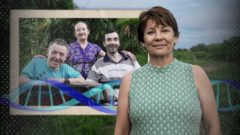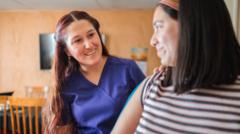In the little town of Serrinha dos Pintos, located in northeastern Brazil, a profound mystery surrounding a rare disease has recently found clarity, thanks to the dedication of geneticist Silvana Santos. Over two decades ago, Santos arrived in this remote community, where nearly 5,000 residents live in geographic isolation, and discovered that a staggering number of children were losing their ability to walk.
Her research led to the identification of Spoan syndrome—a genetic mutation that weakens the nervous system, evident only when inherited from both parents. This marked the first recognition of the syndrome worldwide, propelling Santos into the spotlight as one of the BBC's 100 most influential women in 2024.
Prior to Santos's work, families were left without answers, coping with the heart-wrenching reality of their children’s declining health. One patient, Marquinhos, expressed gratitude, stating, "She gave us a diagnosis we never had. After the research, help came: people, funding, wheelchairs."
Santos, originally from São Paulo, a city far removed from the rural lifestyle of Serrinha, found herself linked to the community through an intricate web of relationships, as many residents were related to her extended family. This familial connection fueled her curiosity and commitment to understanding the condition affecting many in her hometown.
In her initial holiday trip to Serrinha, she observed a remarkable social pattern— a significant prevalence of cousin marriages. Santos's investigation revealed that 30% of couples were related, correlating with a heightened risk of inherited genetic disorders. In fact, geneticist Luzivan Costa Reis highlighted that the risk for children conceived by cousins rises to 5–6% per pregnancy, compared to 2–3% for unrelated couples.
After years of fieldwork and analysis, Santos’s team published their findings in 2005, linking the disorder to a specific genetic mutation characterized by the loss of chromosome fragments—information crucial for providing families with diagnoses and aiding public health initiatives.
Although the syndrome has no current cure, the significance of awareness and support cannot be overstated. Wheelchairs have provided newfound independence to patients who once faced isolation and stigma. Santos continues to advocate for improved understanding of genetic risks in cousin marriages while rolling out preemptive screening for couples in the community.
For residents like Inés, whose two sons suffer from Spoan syndrome, the journey toward acceptance and adaptation remains filled with love and challenges. As the local families navigate the complexities of genetic inheritance, Santos’s legacy lives on—promoting education, awareness, and a brighter future for individuals battling Spoan syndrome. "It's as if Santos is family," Inés reflects, illustrating the profound connections fostered through research and empathy in Serrinha dos Pintos.













